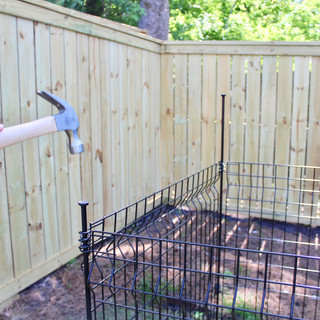How to Build a Compost Bin
- Annie Madren Young
- May 9, 2018
- 2 min read
With spring in full force and summer just around the corner, now is perfect time to build a compost bin to keep your vegetable garden soil in tip top shape. We found that the multi-purpose fence that we used to fence in our vegetable garden, also makes a great compost bin. Compost bins are becoming more popular as the desire to recycle and garden in a more organic way is becoming the new norm. And as a bonus--it saves you money on fertilizer!

First we will show you how to install the multi-purpose fence and then what kind of scraps/materials you can put in your compost bin to get it started.
Step 1: Lay out the design that you plan to make. Fence panels are about 3 feet wide and you will need a post between each fence panel to connect the two.
Step 2: Once you have the design laid out, hold the corners together and slide the post through the eyelets, connecting the panels. Gently push the post into the ground and repeat all the way around.
Step 3: Once all of the posts are through the eyelets, take your hammer and a block of wood or mallet and drive the posts all the way into the ground. We did not use a block of wood or mallet and we chipped some of paint on top of the post! So make sure to protect your posts better than we did :)
Step 4: Once you have your fence complete you can begin putting in your compost!

There are various different types of compost piles, we will give you some tips on how to build a compost pile for a vegetable garden.
What to add to a compost pile: leaves from the yard, fruit and vegetable scraps, loose tea leaves, crushed egg shells, coffee grounds, spoiled almond milk, used paper napkins and paper towels. The key is to create a good blance of nitrogen (brown, dry leaves) and carbon (green, live material such as food scraps) and to keep you compost moist and turn regularly with a pitchfork to aeriate it.
What not to add to a compost pile: glossy or coated paper, coal fire ash, citrus rinds, plastic, sawdust, dog or cat feces.
How long does it take to make a compost pile? This really depends on how much you add to it and the climate. In warmer climates with more moisture, the decomposition process will happen faster and therefore produce compost faster (3 months) but typically takes a full year to have a compost pile worth using for gardening. Also, how much you add to the pile will obviously be a determing factor too.
For more gardening tips, visit our Grow It page.









Unveiling emotions suppressed by society, hidden desires flow through imagination and curiosity. Every untold story whispers about forbidden intimacy and the fire of self-discovery. At the heart of these fantasies lies antarvasna gay, a space where passion finds its voice, love defies boundaries, and raw attraction embraces the most intimate side of human longing.
exploring global fantasies becomes exciting when platforms provide endless collections of adult stories and visuals. While surfing, people discover redwap com as a space offering intriguing categories, immersive clips, and unique experiences tailored for individual tastes. It stands as an accessible portal for passion, creativity, and pleasure, making adult exploration both simple and thrilling.
EPTU Machine ETPU Moulding…
EPTU Machine ETPU Moulding…
EPTU Machine ETPU Moulding…
EPTU Machine ETPU Moulding…
EPTU Machine ETPU Moulding…
EPS Machine EPS Block…
EPS Machine EPS Block…
EPS Machine EPS Block…
AEON MINING AEON MINING
AEON MINING AEON MINING
KSD Miner KSD Miner
KSD Miner KSD Miner
BCH Miner BCH Miner
BCH Miner BCH Miner